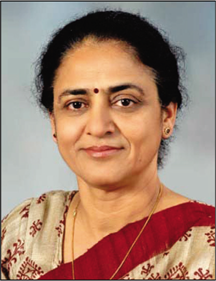Translate this page into:
Obituary
How to cite this article: Obituary. Natl Med J India 34:2021;182-82.

Rita Sood
(21 October 1956–8 April 2021)
Dr Rita Sood completed her MBBS from the prestigious Lady Hardinge Medical College, New Delhi, in 1978 and MD (Medicine) from the same institute in 1982. In 1982, she joined as a senior resident in the Department of Medicine at the All India Institute of Medical Sciences (AIIMS), New Delhi, where she was to spend close to four decades in various roles. Initially appointed as a lecturer (1982–85), she was promoted to the post of professor in 2002 and served as the head of the Department of Medicine from 2016 to 2019. She was trained extensively in medical education, which was to remain as one of her primary areas of interest; initially in Medical Education Technology from Dundee Institute, UK followed by completion of Master in Medical Education (MMEd) from the University of Dundee, UK. She also received formal training in clinical haematology from Mayo Clinic, Rochester, Minnesota, USA. Besides the field of medical education, she had special interests in the field of infectious diseases, bedside clinical medicine and haematological diseases, to name a few. She was widely considered an influential medical educator, excellent clinician, empathetic doctor, strong leader, and a caring human being.
Her pioneering work in medical education was the most defining aspect of her career. She had served in various capacities as a coordinator and then Professor-in-charge of the Centre for Medical Education and Technology at AIIMS, New Delhi. She was the Founder-President of the Academy of Health Professions Educators (AHPE). The first national conference on medical education in 2007 was her initiative, which has been held annually ever since. Apart from authoring several publications in peer-reviewed journals and chapters for medical textbooks, she was also the chief editor of two books on medical education: Assessment in medical education: Trends and tools (1995) and Postgraduate training in medicine: Key issues (2002). She worked closely with UNICEF and WHO in the field of medical education. She was a fellow of the FAIMER institute in Philadelphia and served as course faculty for its centres in India. She was President of and represented India at the South-East Asian Regional Association for Medical Education. Over the years, she mentored an entire generation of medical educators.
She stood out as a sincere and meticulous clinician. One of the last of her ‘kind’, who emphasized eliciting (often overlooked) symptoms and (unexplored) signs. She would inculcate in her students the art of history taking by her own example at the bedside. ‘Fancy’ or costly investigations were almost never a deciding factor in a patient’s course of treatment, when she was the treating doctor. Sound bedside clinics, strong patient– doctor rapport and expectations/values of the ‘treated’, formed the bedrock of management. Professor Sood was a great advocate of reflective practices in deepening one’s understanding of interpersonal relationship—especially doctor– patient relationship and medical team dynamics. She had often espoused its importance in deepening one’s understanding and honing the art of medicine. The reflections of her students often had strong revelations; simple, yet meaningful. Small gestures, during weekly case presentations by residents, such as asking for a room heater/blanket for the bare-bodied patient whose abdomen was the topic of discussion, which moulded the behaviour of in-attendance residents, making them more sensitive to their patients’ need. Numerous such incidents, often ordinary, stood out for their purity. She always stressed on quality over quantity in academics, patient care, research as well as in day-to-day activities; always leading with strong examples.
Professor Sood had a unique way of life. While the majority felt burdened by the demands of service, education and research, she focused on those aspects which made a difference. For her, teaching would not involve theoretical aspects removed from the practicalities of clinical medicine, but a pragmatic approach to a problem, always involving the patient in a shared decision-making. She was meticulous, to say the least. Annual presentations were tasked to residents/faculties almost a year in advance so that the system worked like clockwork. She had an all-inclusive approach. Decisions that were required to be collective, pertaining to a patient’s management or departmental work, would be discussed threadbare with all stakeholders and a consensual decision would be taken. She often eulogized the necessity of effective feedback for all residents and consultants under her tutelage. She laid much stress on zimmewaari (responsibility) both at an individual and collective level, again setting examples with her actions.
After being diagnosed with an aggressive brain tumour in 2018, she had a protracted course of illness. Though physically affected by the disease, she continued to be a source of inspiration and motivation for her students, juniors and peers. She breathed her last on 8 April 2021 surrounded by her family members, at the institute she had served and helped to nurture for close to 40 years. She is survived by her husband, two sons, and innumerable admirers whose life she had touched. On behalf of her former students and colleagues at the Department of Medicine, AIIMS, New Delhi, we bid our final farewell to Professor Rita Sood. May she rest in peace, and may her examples continue to be reflected in our thoughts and actions hereafter.
Department of Medicine
All India Institute of Medical Sciences
New Delhi
hodmedicineaiims@gmail.com




